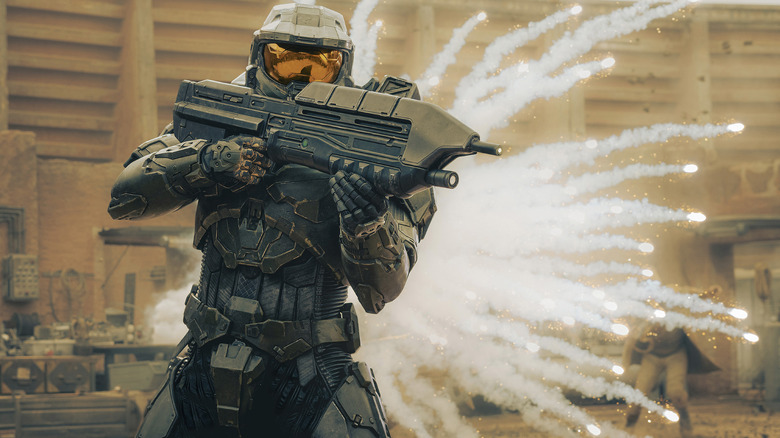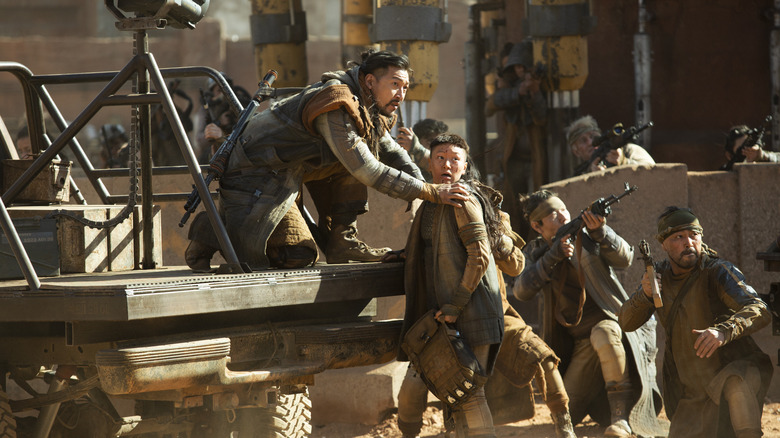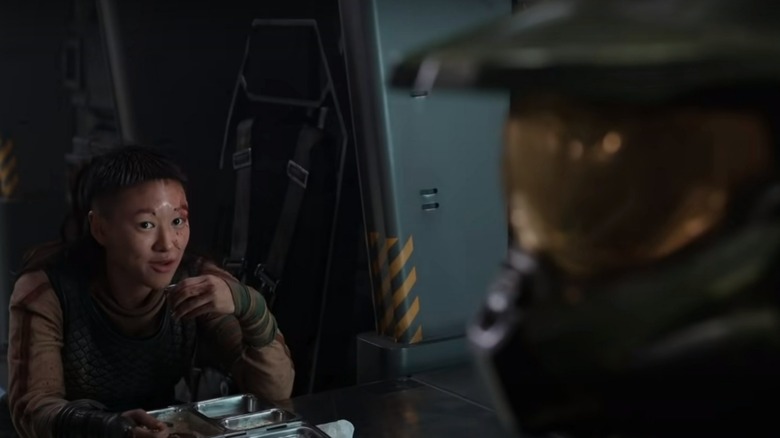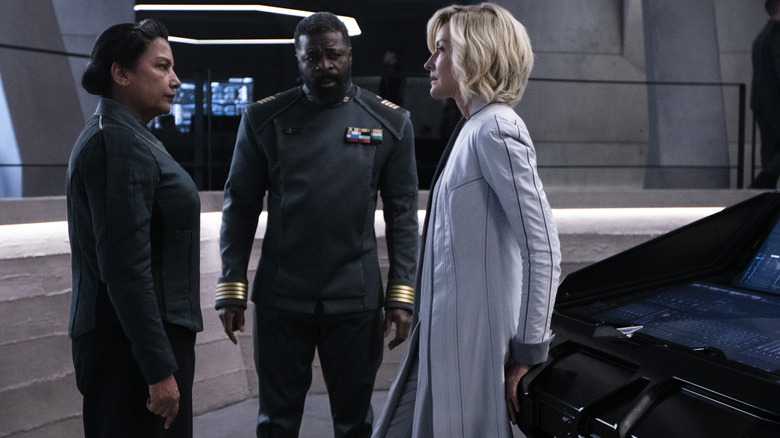Halo Makes First Contact In A Messy, If Promising Premiere
Looking back, it's remarkable to think about how a first-person shooter called "Halo: Combat Evolved" triumphantly arrived on the scene in 2001 and changed the medium forever, boldly introducing us to that eponymous ringworld within its very first few seconds and wasting no time moving the action to one of the most well-realized settings of any modern sci-fi video game.
Two decades and several wildly successful sequels, spin-offs, and tie-in novels later, the Paramount+ "Halo" series has finally airdropped onto a screen near you, in a way that's both familiar to what came before ... and not. The title remains the same. The tiniest details of the Master Chief's memorable character design have been lovingly translated into live action. Gargantuan amounts of resources, reportedly amounting to over $10 million per episode, have made it possible to bring alien environments and otherworldly foes to incredibly photorealistic life. And on top of it all, a second season has already been greenlit. By any reasonable estimation, viewers couldn't have possibly imagined a better outcome for a franchise adaptation that has spent years floundering in various stages of development limbo, where a plethora of notable creatives — Alex Garland, Neill Blomkamp, and Rupert Wyatt among them — couldn't put a dent in the formidable and surprisingly dense material.
So what can we make of the fact that, with so much established lore to pull from and a very straightforward guideline to follow, the premiere episode of the new "Halo" series instead charts its own path altogether and immediately feels so different?
Luckily, we don't have to answer that all-encompassing question just yet. Instead, I'm going to take a piecemeal approach over the next several weeks, breaking down every hour of the first season of "Halo." Each of these weekly installments will split into a few main sections: a recap and analysis of the ongoing story arc, a round-up of all the nerdiest Easter eggs, references to/divergences from the source material, and various observations about each episode.
Although I admittedly engage with this series as a big fan of the games and the supplementary material covered in various novels, my main takeaway from the first two episodes (which I reviewed here) is that we'll all have to recognize that "Halo" is far more of a spiritual adaptation than a direct one. Whether that approach will pay off in the end, ultimately, is a topic that's sure to inspire all sorts of debate. So let's get started!
Spoilers for "Halo" episode 1 follow.
Arc of the Covenant
The series premiere — directed by filmmaker Otto Bathurst and simply titled "Contact" — needs only a few minutes to set the tone for what's to come.
Where "Combat Evolved" began in the depths of space, following the crew of a battle-damaged warship on the cusp of the discovery (and existential threat) of a lifetime, "Halo" opens on a sweeping, overhead vista of a dusty, Mars-like world called Madrigal in the year 2552. The first characters we meet aren't futuristic Spartans or other members of the ubiquitous UNSC (United Nations Space Command) but, tellingly, a batch of diverse rebels scraping together a meager existence of "heavy water extraction" on a far-flung Outer Colony world. And based on the initial conversation we drop into that takes a decidedly anti-Spartan and anti-UNSC tone, the downright heroic portrayal of rebel general Jin Ha (Jeong-hwan Kong), and our subsequent introduction to his stubborn and inquisitive teenage daughter Kwan Ha (Yerin Ha), it quickly becomes clear that the Insurrectionists may just be the one and only faction of unambiguous "good guys" that we'll see in the early going.
So naturally, they're all about to get completely wiped out. The same sense of distance that provides security to this forlorn outpost (in an early hint of the show's frustratingly vague and murky world-building, it's never made clear just how far removed they are from the main goings-on of the galaxy or even whether they're the only inhabitants of this planet) also makes them a prime target of an invading vanguard of Covenant forces, searching for some sort of mystical object underneath the planet's surface. As encountered in utterly brutal fashion by Kwan and her friends only moments before (whose only crime was the urge to get high), the extraterrestrial Elites sweep through the human defenders with little resistance, splattering shocking amounts of gore as they mercilessly attack civilians and soldiers alike.
Right on cue, the dramatic entrance of the Master Chief John-117 (Pablo Schreiber, stoic and blandly generic, making him an ironically faithful depiction of the game's main "character") and his Silver Team of Spartan squadmates finally makes "Halo" feel like, well, "Halo." The unconvincing and somewhat amateurish attempts to render the super-soldiers' fight choreography into live action, however, will likely only make viewers wish they'd fired up their Xbox instead. A bewildering mix of handheld shots, jarring shaky-cam, and POV camera angles from inside the Chief's helmet all collide in a frenzied firefight that left me wanting more. The fact that this is the episode's only real set piece almost feels like a blessing in disguise.
At the very least, this allows the rest of the sequence to concentrate on the mysterious object, the debilitating effect it has on John, and most importantly, the task of bringing the Spartan and Kwan into close contact, establishing the pairing and moral dilemma that'll form the emotional backbone of the episode.
The cost of war
The awakening memories of John's artificially repressed childhood, unlocked by physical contact with the "relic" (as described by the decrepit Covenant Prophet of Mercy and his disturbingly human ally/captive Makee, played by Charlie Murphy), seems to unmoor the otherwise unshakable soldier and plant the seed for doubt in the chain of command. After UNSC leadership (made up of Shabana Azmi's Admiral Margaret Parangosky, Natascha McElhone's Dr. Catherine Halsey, and Danny Sapani's Captain Jacob Keyes) unsuccessfully attempts to use goodhearted scientist Dr. Miranda Keyes (Olive Gray) to manipulate Kwan into spreading pro-Spartan propaganda to other Outer Colonies, John is finally given an order he must refuse: an "Article 72" for the Chief to execute Kwan in cold blood and erase all evidence of the Madrigal massacre.
His choice to do the exact opposite and the slow gaining of trust between the unlikely twosome when they openly defy his superiors — despite the Master Chief's killing of Kwan's mother on a separate mission, years in the past, a reprehensible action that inextricably links the two — easily provides the best and most satisfying moments of the episode, as fleeting as they may be. Though the Master Chief's grand (and sure-to-be controversial) unmasking moment at a suspicious Kwan's gunpoint perhaps fails to measure up to comparable scenes involving Kylo Ren (Adam Driver) late in "Star Wars: The Force Awakens" or Pedro Pascal's Din Djarin in "The Mandalorian," it's still well-earned — especially when juxtaposed with earlier conversations between the two, when Kwan attempts to uncover any semblance of the actual man behind the title of "humanity's best weapon." As much as numerous zoom-ins and lengthy holds on his featureless visor hint at the turmoil quietly raging underneath, it's more important that we actually see the character's face, giving us an emotional window into what should be a character-defining act of rebellion and the first step taken towards regaining his humanity.
When another instance of physical contact with the Covenant object allows the pair just enough time to escape the UNSC and fly off into parts unknown, it feels genuinely thrilling to have no idea what the story holds next. Even the oddly low-energy, disjointed, and unexpectedly small-scale feel of the preceding 50+ minutes is salvaged somewhat by the episode's final moments, which implicitly promise a blank slate full of potential in the weeks to come.
(Re)claim to fame
Reclaimers. This term holds special significance for fans of the original "Halo" games and, I suspect, will eventually do the same for viewers of the Paramount+ series. In traditional franchise lore, it's a title applied to unique individuals (like our own Master Chief) who are capable of harnessing alien technology to a certain extent. For our purposes here, we're using it as shorthand to describe the types of viewers who have the added context of the games and various tie-in stories to further appreciate (or not) the directions this new series is taking.
But don't fret, newcomers! Just as the show is geared towards both kinds of viewers, feel free to nerd out in this section with the rest of us. Because of the creative team's decision to set this in an alternate but loosely connected "Silver Timeline," any stray thoughts I discuss here about the potential future of the series will be nothing more than conjecture. Anything and everything from previous video games or novels are up for grabs, to be clear, but as far as the show is concerned? This is a laid-back, spoiler-free zone where anything's on the table.
- Halo Watch: There are exactly zero Halos (in non-holographic form, anyway) to be seen throughout the premiere. I'll be honest, I'm a little nervous that this season is plodding towards a cliffhanger finale where we only just make it to the ringworld before cutting to black. You know, because apparently everything has to be an origin story these days, no matter how unnecessarily drawn-out. Keep an eye on this space for constant updates on this pressing concern!
- Support System: For my tastes, this episode could've done with a few more moments dedicated to the burgeoning John/Kwan team-up. With so much time spent with the supporting cast, then, it's a little odd that so few make any kind of real impression. The little family drama between canonical "Halo" characters Dr. Halsey, Captain Keyes (by the way, I'm still not sure why he's in a political position instead of, uh, captaining a spaceship?), and Miranda Keyes is briefly laid out, but not explored nearly enough to make me invested just yet.
- Politics, Shmolitics: Speaking of which, the interoffice bickering between Dr. Halsey's Spartan division, Miranda's scientific section, and the constantly short-tempered Admiral Parangosky is a prime example of an interesting concept on paper coming across as dreadfully boring in practice. Although Natascha McElhone does make a veritable meal out of every tense exchange and subtle eye-roll at orders she doesn't like.
- What's in the Box? I have no complaints about this show's reimagination of Dr. Halsey, the mastermind behind the Spartan program. Her disturbingly motherly relationship with the Master Chief comes through on a subtextual level, her arrogance and chafing at authority is clearly established, and her penchant for impulsive and ill-advised side-projects is hinted at by her repeated references to Cortana and that clone chilling out in her office. This storyline's already veering off-track from the games and I, for one, am cautiously optimistic about whatever season 1 showrunners Steven Kane and Kyle Killen have up their sleeve here.
- Prophet Margins: On that note, anyone else thrown by our awfully brief check-in on the Covenant side of the plot? The Prophet of Mercy plays a huge role in franchise canon, though Charlie Murphy's enigmatic "Blessed One" is a wholly new creation for the show. It's too soon to come down one way or another on this subplot.
- Leave Master Chief Alone! The sheer lack of privacy afforded to Master Chief — his every movement recorded via helmet cam, health monitoring through his suit, intrusions from Dr. Halsey for status reports, his superiors taking over his Pelican dropship and sucking out all the oxygen, etc. — is a neat way to emphasize just how little agency the Master Chief and the other Spartans really have. The UNSC is really, really not depicted in a flattering light here.
- Let Me Have This: Soon after Miranda Keyes' unsuccessful attempt to reach out to Kwan early on, a UNSC officer in the background namedrops "Commander Shepard," which I'm choosing to interpret as a fun little nod to "Mass Effect."



